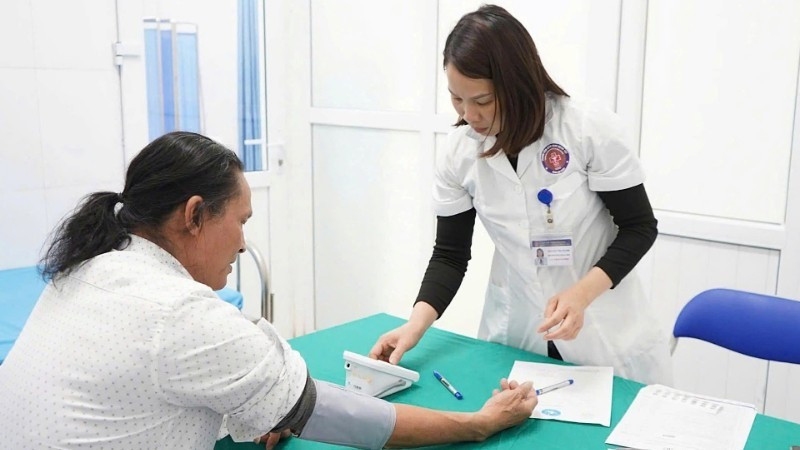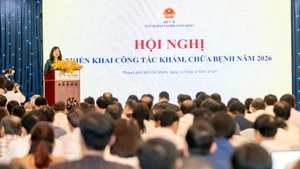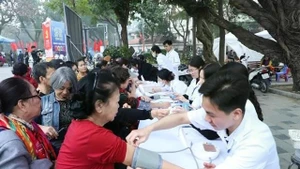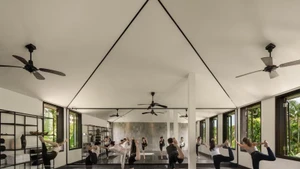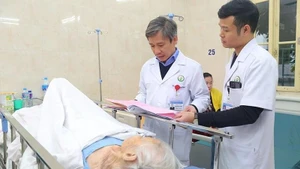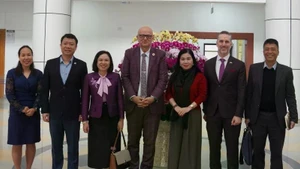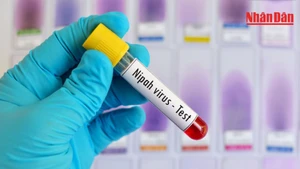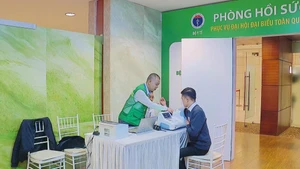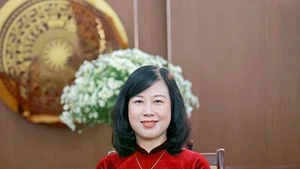The Ministry of Health is currently expediting the development of a master plan to roll out this humane policy starting in 2026.
Speaking to the press, Minister of Health Dao Hong Lan affirmed that Resolution No. 72-NQ/TW continues to reflect the Party’s deep concern for the health of the people, aiming to build a healthy Viet Nam in which everyone has access to healthcare and lives longer, healthier, and better. It also seeks to enhance physical well-being, health awareness, and disease prevention across society. One of the resolution’s central themes is accelerating healthcare financing reform and developing a sustainable, effective health insurance policy as the foundation for implementing universal hospital fee exemption.
Providing basic-level hospital fee exemption for all citizens through health insurance, beginning in 2026 and reaching the target by 2030, is a humane policy that demonstrates the superiority of the socialist system and carries profound social security significance. This policy will promote early disease detection, reduce medical costs, and reaffirm the principle that people are at the centre of, and are given top priority in, all policies on healthcare protection and improvement. As such, the Ministry of Health is urgently finalising the details of the implementation plan.
Providing basic-level hospital fee exemption for all citizens through health insurance, beginning in 2026 and reaching the target by 2030, is a humane policy that demonstrates the superiority of the socialist system and carries profound social security significance.
Minister of Health Dao Hong Lan
The hospital fee exemption policy is built on the foundation of health insurance and implemented in phases. The State and the health insurance fund will cover basic and essential medical costs, thereby significantly reducing the financial burden on citizens, especially socially disadvantaged groups, low-income earners, and other priority populations.
For on-demand medical services that exceed the basic level, patients will still be required to make out-of-pocket payments, thereby promoting responsible and cost-conscious use of services. Consequently, the hospital fee exemption policy must be closely linked with the goal of achieving universal health insurance coverage. Every citizen needs to participate in health insurance to share risks—those who are better off supporting the poor, the healthy assisting the sick—together with State subsidies, ensuring that no one faces extra financial hardship when illness strikes.
Regarding coverage benefits, citizens will be entitled to free annual health check-ups or screenings at least once per year and will have electronic health records to monitor diseases across their lifespan.
The policy will begin in 2026, with a phased increase in payment rates and allocations for disease prevention, early diagnosis, and treatment for specific conditions and priority groups, financed by the Health Insurance Fund. This approach aims to ease the financial burden on patients while aligning with the planned increase in health insurance contributions from 2027 as prescribed by law.
The State budget and the Health Insurance Fund will cover certain preventive services, chronic disease management, regular check-ups, and professional screenings at primary healthcare levels according to a suitable roadmap, thereby helping to prevent disease, reduce morbidity and mortality, and cut treatment costs. The ultimate goal is to ensure that every citizen has access to essential healthcare services without financial hardship.
At the National Conference on September 16 to implement four Politburo resolutions, Deputy Prime Minister Le Thanh Long stated in his report on Resolution No. 72-NQ/TW that the Government has carefully assessed its financial capacity and confirmed sufficient budgetary balance to execute the roadmap for basic hospital fee exemption within health insurance coverage. The annual cost for periodic health check-ups for around 100 million citizens is estimated at 30 trillion VND, with employers contributing about 5 trillion VND while the remainder is to be covered by the State budget. The Deputy Prime Minister also affirmed that the State can ensure financial balance during the initial stage and has long-term solutions in place.
Minister Dao Hong Lan further emphasised that the resolution does not aim for “absolute free healthcare,” but rather seeks to minimise citizens’ co-payment rates, expand health insurance coverage, reduce deaths caused by late disease detection, and build an equitable, efficient, sustainable healthcare system in which no one is left behind. The policy ensures that everyone can access medical services without financial anxiety.
The policy of universal hospital fee exemption can be considered a “manifesto” for Viet Nam’s healthcare strategy — shifting from passive treatment to proactive prevention and early detection of disease. Achieving this goal would mark a major step forward in social welfare.
Sharing views on the universal hospital fee exemption initiative, representatives from medical institutions agreed that it can be considered a “manifesto” for Viet Nam’s healthcare strategy — shifting from passive treatment to proactive prevention and early detection of disease. Achieving this goal would mark a major step forward in social welfare. With the determination of the entire Party, people, and political system, along with a carefully planned roadmap, this policy will be successfully implemented, bringing practical benefits to all citizens.
Dr. Ha Anh Duc, Head of the Department of Medical Service Administration under the Ministry of Health, noted that relevant agencies are developing a detailed plan specifying the necessary tests and diagnostic services. The goal is to design an efficient, cost-effective, and high-quality health check-up package ensuring that everyone has the opportunity to undergo regular medical examinations. To enhance the quality of healthcare services, the ministry will also invest in human resources, infrastructure, and equipment for grassroots healthcare facilities.
According to Viet Nam Social Security, the Health Insurance Fund currently covers 87–89% of total insured healthcare costs, with participants co-paying 11–13%. Therefore, implementing universal hospital fee exemption will help eliminate financial burden and enable people to access basic medical services.
In conclusion, universal hospital fee exemption marks a significant turning point, transforming Viet Nam’s healthcare system from treatment-based to preventive and primary care. It also reaffirms the Government’s commitment to improving citizens’ quality of life, for a healthy, civilised, and prosperous Viet Nam in the new era.
